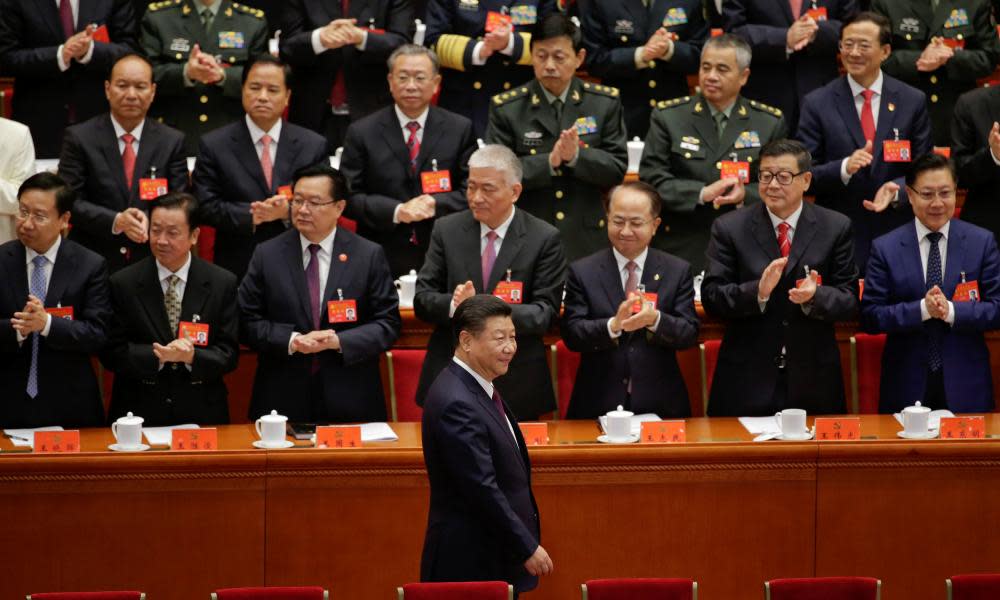Xi Jinping heralds 'new era' of Chinese power at Communist party congress

Xi Jinping has heralded the dawn of a “new era” of Chinese politics and power at the start of a historic Communist party congress celebrating the end of his first term in office.
Speaking in Beijing’s Great Hall of the People, at the start of the week-long 19th party congress, Xi told delegates that thanks to decades of “tireless struggle” China stood “tall and firm in the East”.
Now, Xi said, it was time for his nation to transform itself into “a mighty force” that could lead the entire world on political, economic, military and environmental issues.
“This is a new historic juncture in China’s development,” China’s 64-year-old leader declared.
“The Chinese nation ... has stood up, grown rich, and become strong - and it now embraces the brilliant prospects of rejuvenation ... It will be an era that sees China moving closer to centre stage and making greater contributions to mankind.”

Xi warned that achieving what he has dubbed the “China Dream” would be “no walk in the park”: “It will take more than drum beating and gong clanging to get there.”
“[But] our mission is a call to action ... let us get behind the strong leadership of the party and engage in a tenacious struggle.”
Xi became the Communist party’s general secretary - and thus China’s top leader - at the last party congress, in 2012, and has since emerged as one of China’s most dominant rulers since Mao Zedong.
In a surprisingly long three hour and 23 minute address entitled “Secure a decisive victory in building a moderately prosperous society in all respects and strive for the great success of socialism with Chinese characteristics for a new era”, Xi struck an upbeat tone that contrasted with the grey skies and drizzle outside.
“The Chinese nation is a great nation - it has been through hardships and adversity but remains indomitable. The Chinese people are a great people - they are industrious and brave and they never pause in pursuit of progress,” he said.
“The Communist party of China is a great party - it has the fight and mettle to win”.
Xi warned that corruption remained the greatest threat to the party’s survival despite a five-year war on corruption that he claimed had “built into a crushing tide”. “We must remain as firm as a rock ... and secure sweeping victory,” he said warning that pleasure-seeking, inaction and sloth” were no longer acceptable.
Xi, who has sought to portray himself as a strong and stable international statesman since last year’s election of Donald Trump, also painted China as a responsible global power that was committed to tackling shared dangers such as climate change.
“No country alone can address the many challenges facing mankind. No country can afford to retreat into self-isolation,” he said.
Without directly mentioning Trump, he noted how China had “taken a driving seat in international cooperation to respond to climate change”.
More than 2,200 delegates have poured into Beijing for the week-long gathering, bringing with them an effervescence of political tributes.
“This is a joyous occasion,” Hu Xiaohan, the director of the Congress’ media centre, enthused at a reception on Monday night.
The event, which Xi will use to pack the Communist party’s upper-ranks with allies, marks the official end of what was expected to be the first of two five-year terms in power.
For some though it has come to represent the advent of a new political era that could extend well beyond the originally anticipated end of Xi’s second term, in 2022.
Chen Daoyin, a Shanghai-based political scientist, said he believed the congress heralded the start of China’s third great political epoch since Mao Zedong’s communists seized power in 1949.
The first epoch was Mao himself, a revolutionary standard-bearer who helped the country find its feet; then came Deng Xiaoping, the reformer who masterminded China’s economic opening and helped it grow rich. “Now it’s Xi Jinping’s turn to usher in ... the Xi Jinping era,” said Chen.
He predicted Xi would be remembered as the leader who made China a “strong and powerful” nation: “Being strong first of all means being a global power - being a world leader and therefore leading the world. It also means that the Communist party must be strong, and that it must maintain one-party rule.”
Elizabeth Economy, the director for Asia studies at the Council on Foreign Relations, said she also considered Xi a transformative figure who saw himself in the same tradition as Mao and Deng.
“I don’t think there’s a lack of confidence in Xi Jinping,” said Economy who is writing a book on the Communist party leader called The Third Revolution.
“I think he believes that in order to reclaim China’s historic greatness, its centrality in the world, that China needs a strong leader - and he is the person for the job.”
Economy compared Xi’s bold political vision to a pyramid: “Xi Jinping sits on top of the Communist party, the Communist party sits on top of China - and China sits on top of the world.”
Additional reporting Wang Zhen
What is Xi Jinping’s background?
How long can a Chinese president serve for?
Why is corruption such a problem in the Communist party?

 Yahoo News
Yahoo News 
